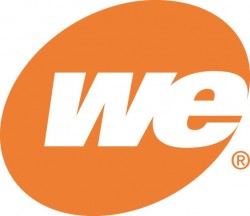Monopoly Greed
We Energies grabs big profits and big executive pay while driving electric rates into the stratosphere.

We Energies
These are good times for We Energies chief executive Gale Klappa. According to Forbes magazine, he earned a whopping $17.27 million in compensation last year, and nearly $49 million in the last five years.
Utility executives, Forbes reports, are at the low end of the pay scale for CEOs, with a mere $6.1 million average in annual compensation. Klappa is the third-best paid utility CEO in the nation — this, in a market (the Milwaukee metro area) that ranks 39th in the nation.
How can the company afford to pay him such a kingly salary? By driving its electric rates ever higher. As recently as 1990, Wisconsin’s rates were 12 percent lower than other Midwestern states and well below the national average.
Not any more. A new study by the state Public Service Commission (PSC) shows electric rates are now 21 percent higher than other Midwestern states and 10 percent higher than the national average.
Keep in mind that electricity providers in Wisconsin are public monopolies, overseen by the taxpayer-funded PSC, whose actions in turn are watch guarded by the nonprofit Citizens Utility Board (CUB). And yet Wisconsin utilities have been allowed to jack up electric rates by 55 percent from 2002-2010, during a period when inflation rose by just 20 percent. One can only imagine how high rates might have risen without all this oversight.
As dramatic as all these figures are, a Milwaukee Journal Sentinel story covering the report did not include any of the statistics. It’s the sort of data a reporter would kill for — unless his editors would prefer to soft pedal the study.
We Energies is a big part of these rising rates. A study by the UW-Milwaukee Employment & Training Institute found that the average cost of heat and electricity for city of Milwaukee renters, all customers of We Energies, nearly doubled in just six years, rising from $1,318 in 2000 to $2,227 in 2006.
Those generous profits, in turn, help pay for huge bonuses for We Energies executives, which amounted to $77 million over the last three years, according to annual reports it files with the PSC.
Company officials are quick to note that ratepayers cannot be charged for any stock options or incentive pay awarded to executives — a point that was reiterated twice by Kristin Ruesch, spokesperson for the PSC. In reality, says CUB executive director Charles Higley, “it all does come from rate payers.”
Every increase in gas and electric rates helps increase company profits, which shareholders can do what they want with, and every year they chose to award some whopping incentives to executives. Perhaps all that profit leaves the company’s board members feeling generous, or maybe it’s the fact that their annual director fee is in turn paid by Klappa and the executives.
Those profits have also been good for the company’s stock price, which has risen by 17 percent year-t0-date (33% over the past calendar year). We Energies enjoyed record earnings in the first quarter of 2012 (and will announce its second quarter results on Wednesday.)
What’s most remarkable about the rate hikes the PSC keeps awarding We Energies is that the company is a legal monopoly that faces none of the risks a normal for-profit business faces. If it runs into troubles, it can simply petition the PSC for a rate hike to pay for the problem. Investing in utilities has long been known as a very safe investment, yet year after year we hear that the company needs high enough rates to assure a good return for stockholders.
May I suggest we needn’t worry about the poor shareholders? In the last 22 years, the profit margin for the company has been more than 10 percent in all but two years — this, during a period when the stock market has had many flat to simply dreadful years. Meanwhile, We Energies rate payers are getting killed, hurting the state’s manufacturers and making energy horribly expensive for low-income Milwaukeeans.
Yet We Energies would like to see more increases in the years to come. Company officials are requesting an annual increase of 3.6 percent for both 2013 and 2014, though the estimated rate of inflation for those years is 2.2 percent and 2.3 percent respectively. Those shareholders and executives, you see, must be assured their customary rewards.
Murphy's Law
-
Top Health Care Exec Paid $25.7 Million
 Dec 16th, 2025 by Bruce Murphy
Dec 16th, 2025 by Bruce Murphy
-
Milwaukee Mayor’s Power in Decline?
 Dec 10th, 2025 by Bruce Murphy
Dec 10th, 2025 by Bruce Murphy
-
Total Cost of Foxconn Is Rising
 Dec 8th, 2025 by Bruce Murphy
Dec 8th, 2025 by Bruce Murphy





















What would we do without ya! All the Best from Blau
This ruined my day.
Really? This along with the Brewer’s tax. Such blatant examples of corruption in the name of the public interest.
What is the real argument for private utilities? I mean, I know the government isn’t always that efficient, but still…. is there any real evidence that the current sustem works better than a true public utility?
Your comments about We Energies mixed so many apples and oranges together that I think you’ve actually ended up with a banana. I don’t know where to begin.
But there is one thing you did omit. The reason that electric rates for all Wisconsin utilities have risen in the last decade is because of the billions of dollars that have been invested by those utilities to upgrade the state’s electric infrastructure. A decade ago, you were worrying about whether or not the lights would stay on during some hot summer days here in Wiscosnin. Here’s a news flash. In July 2012…they did.
Rick,
The details presented in you appeal to ridicule are overwhelming. Your subsequent red herring seems to be insinuating that a true public utility would somehow not be capable of building infrastructure or performing other maintenance. Surely it could be done, and without gratuitous executive compensation.
Compensation that comes only from a state granted monopoly over the quintessential resource for sustaining modern human life.
Nebraska, which has socialized electricity state wide, has the ninth lowest electric rates in the country.,
http://www.neo.ne.gov/statshtml/204.htm
Doesn’t seem like the Public Service Commission is doing much of a Public Service. How do we hold them accountable? Obviously the Board and over paid executives are going to continue to claim that they have a pressing need for greater rate increases, since their only accountability is to the stock holders, and as long as they contnue to perform better than Con Edison, or PEPCO who failed so miserably in MAryland recently, the consumer stays happy and just keeps accepting the increasing costs. The Citizens Utility Board seems like a feel good group with absolutely no actual power or authority. They primarily seem to assist in the coopting of the consumer to believe that they either cannot, or do not have to step up and do something.
Rick White is right about one thing: in fairness, I should have noted that We Energies undertook considerably investments that also helped drive its rates. That was an error on my part. But that still doesn’t explain why, year after year, there is such a wonderful rate of return for shareholders and such high compensation for its executives. It raises questions about how this legal monopoly is regulated.
Because the provision of electric power has natural monopoly characteristics and is also an economic necessity, Wisconsin and New York State wrote the template for regulating electric utilities in the public interest that was copied by many if not most states. Much of this support has been gutted since the Reagan ‘revolution’. Is it time for Wisconsin to take the lead again?
Now the J-S is attributing WE 2nd quarter profits to a hot spell.
Wonder when they’ll bother to cover the recent Republican gerrymandering
of our electoral districts. Shameless!
Some years ago, when this topic was discussed on another venue, I asked the question about how many of the PCS members moved from that agency to lucrative positions with the very utilities that they were charged with overseeing.
The following is from the Cleaner Valley Website:
A very thoughtful and powerful letter from Barbara Rasman printed in the Milwaukee Journal Sentinel on Friday, July 27:
Clean up power plant
How’s your breathing lately? The July 24 Journal Sentinel article, “Lower ozone standard could save lives, report suggests,” highlighted dangerous levels of ozone and airborne particulate matter. Walking, biking or just waiting for a bus can expose us to Milwaukee’s chronically bad air.
The report is a reminder that the We Energies Menomonee Valley coal plant has been dragging its heels into the 21st century. This out of date 44-year old plant continues to pollute the most densely populated area of the state. Its surrounding community has a high rate of asthma emergency department visits and hospitalizations. Asthma, respiratory illness, heart attacks and premature death from heart disease, coupled with related health care costs, take a toll on Milwaukee’s children, elderly and citizens with breathing disorders.
Experiencing respiratory problems myself, and seeing a drawer of inhalers at the Milwaukee public school where I worked, confirms my belief that cleaner air is an environmental and public health matter. We Energies should take the profit guaranteed by the Wisconsin Public Service Commission and do the right thing: Clean up the dirtiest coal plant in Wisconsin. Would Mequon or Elm Grove tolerate such a health hazard?
Barbara Rasman
Milwaukee
Bruce scores again. Why would the Journal Sentinel not publish these shocking details?